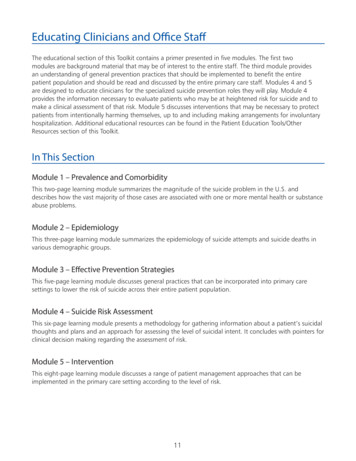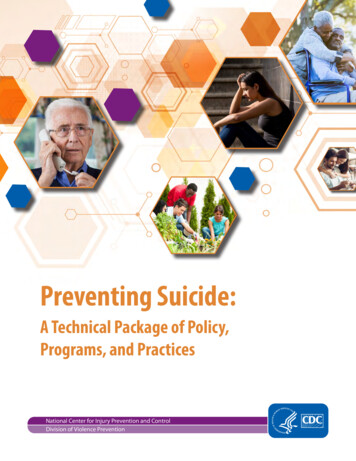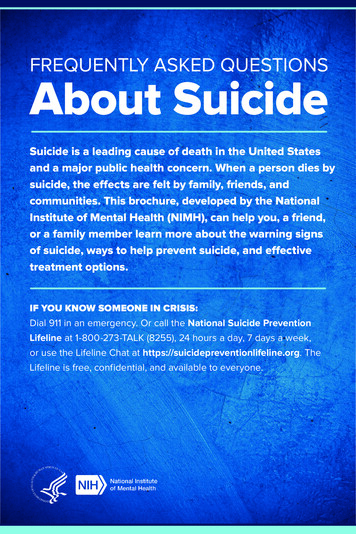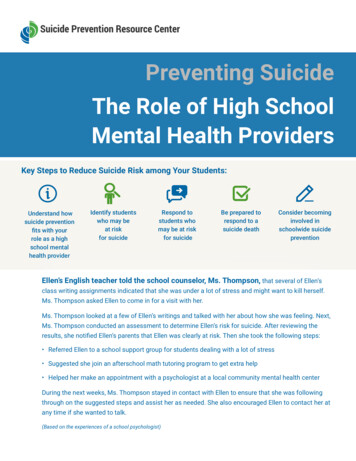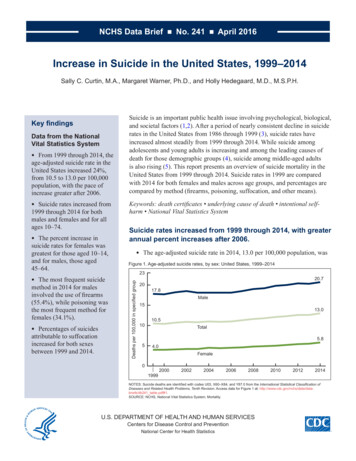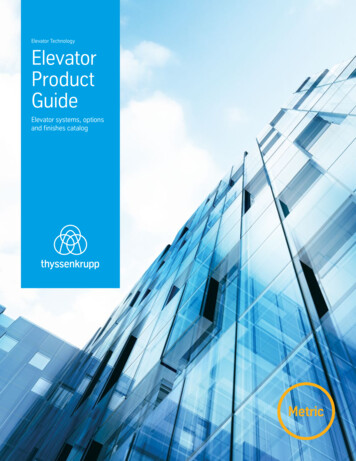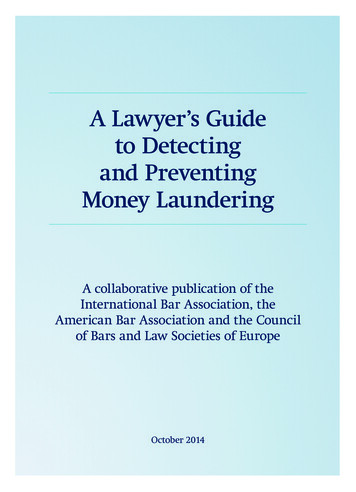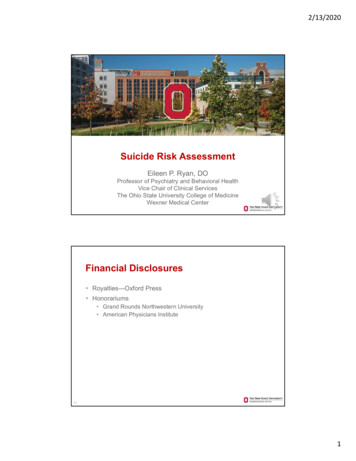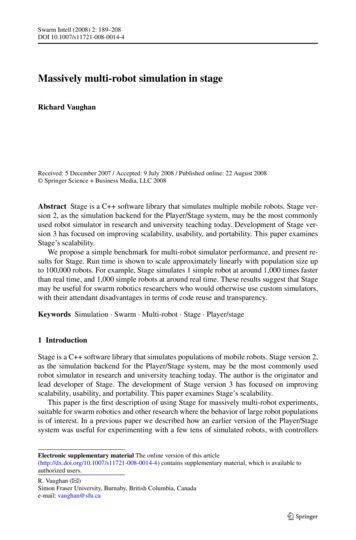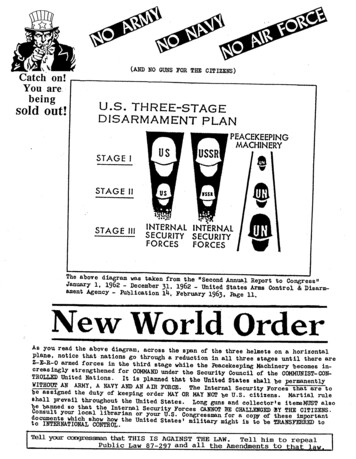
Transcription
THREE-STAGE SUICIDE. 1.DELUDED" :- --":' -' - ---- -. -" . - .-.- - -' :z:.- .-- ---.-- -- - . . . .
vice.pdfLOOK WHAT'S REPLACI NG OURNATIONAL ARMY. A NATIONAL SERVICE PROGRAM!UNIVERSAL PUBLIC SERVICE SYSTEMJ3y Paul ScottA far.reaching proposal on President Nixon's desk that bears careful watchingis a recommendation that he name a special committee to study the feasibility ofestablishing a Universal Public Service System.The little·noticed recommendation was made recently by a White House TaskForce headed by Mrs. Winthrop Rockefeller, wife of the Governor of Arkansasand a political power in liberal Republican circles.The basic idea the new President's committee would explore is that "allAmericans, probably beginning somewhere between ages of 17 and 19. serve theirCountry for two years in one of a vanety of areas, including health and socialwelfare programs. and the military."While similar plans for a Universal Public Service System have been surfacedfrom time to time in the past, what is significant about the new recommendationis its timing and the group making it. Drafted originally by the "Whiz Kids" ofthe Kennedy and Johnson Administrations, the new Universal Public Service pro·posal was proposed by former Defense Secretary Robert McNamara just beforehe became head of the World Bank. At the time, the plan received a cold recep tion in Congress and was shelved.Now revived by the Rockefeller group. it comes at a time that President Nixonhas ordered Defense Secretary Melvin Laird to phase out the military draft by1973.Recruits for the new social army would be laced in "the school system, daycare centers, menea t and ment retardation programs, enere th adl·Hies, community services, police, Ife protection, environment and urban reonewal programs, VISTA, and Peace Corps."Reprinted from The Scott Report, November 4, 1970TO PERPETUATE GLOBAL GOVERNMENT
LOOK WHAT'S REPLACING OUR NATIONAL ARMy .A NATIONAL SERVICE PROGRAM FOR BOYS AND GIRLSOy Paul ScottWashington, November 4 -A tar reaclling proposal l1l Pres\' ntNixon'S desk that bea.rs carefulwalchlng is a. reeomme li lhal he naUle a spee1o.1 c mmmeelu sludy ihe feasibility or tab llsldllg a 'Un! versa! PubUc Ser vice System.The little-noticed recom .mend:ltion was made reeel)Uy bya White Hoose Task Forcehea4edlJy Mrs. Winthrop Rockefeller,wUe of the Governor of Arbnsas nd a po14tleal pow.er 11\ Ubet'alHepubUean elreles.Tile baslctdea tile MW Pres would eXplore.Is tMP'all Amerneans prcba.l ly1Jcg1nrJ1ng somewh re betweeai ent's c mlt-1tt« &S of '1 aAd 19, setVil tMil'.country tOT two years In: me of avarl-ety ohrus., i:neh:it'!li'lghealth:Ultl social wella.npr l"3Ims,andthe. military.'Prestdell Nixon has ordered Detense Secretary Melvin Laird tophase out the miUtltry drall by1913.Support·ers of the propose.dUnlvt:rsai PUblic Setvt e Systembelie-ve tlla.t t .e U-oIl'S m:ut power needs, especlaUy in thehealth and soel& fields, win beso great by 1973 that a compul.sory system of s .J:vtee wUl ben8K«1 to IDl them;By keeping the mUUary optian111 their· plan, tha e! tlergroup believes COlllftSS can beaitles, and cfuld care.personnel would v1rt ly dis appear. And many YQull( pecp1eexposed to public sffvice woltldnurses'NOVEMBER 5, 1970 THE EAGLEchooso to make sornetacet ot ittheir Ute work.""Thoughmechan-.lsms ofoperation and olher dettils arenecessarily vague at th1s.point,"the Ro k eUerTaSk Forc1!pointed out, -"work· seU:inp, ex cept for vOlunteers ror miatary.' serVice, a;re seen as eompiel&lycivilian ami predominantly ooa . YAKIMA, WASHINGTONfederal."Ot tl:ag allRecruitS Cor t1'l.e n w; social4m caa·youth 10 (J\'e two years army * be in "t-hi!01 Pt:bl'lc servdce tlietrcOWJtr1. sdleOi syrteJP, da.y Clrecen(ers,. GM at the ves 01 th nttlital health aM r r: prQPOSed Presidents committet briSU"'. vt . . .wOQ1d be to b1g e .man h Ui esl eo' "".power fteeds aM : prcimote sup vim,pol " . !tie .# t).,.sold on the ideaport for tile new soelaJ llirmy.elWl.iomftel\W d urt ;':'It: :pr ,CL ARlNG THE WAYCorps,,'. . ' , .,. .aM otli oo .·.·' ltv. prO"'1 b tHh andVISTA. aM ent ltal l:lle- Qt IIdi Y 1mg. p .' gtY'I:l ,3cppl"oxl 'r . Force eOM1Yded that thespeM111g v:oU1d be worth ttle ef .fottsta,t1Jlg:. .' u ng the concept of uni While slmUar plans fer :l U n i - T M Rock efeU f , 'l:Il Y·i3 \;.1t ' .rttm1ty versal semee to reality ":illverSlt! PubHc S rvt e Syst-9ftlIn theIr report to ttle Presl str,.e tlhat the tirOf ai.:Wc f . t&-rr.e:me : ))iW- mmi:lli 1n ip'ior' e much th ht, discussionh:l va b surtaeed frem Ume to dellt, tile Rockelder TaskForce also cbaftge the oUt QT :aU. . ! l lQfibWillc twO,yUr-s."am .pla.nnIDg. TlJe elfort isUme in the past, wlWls stg. d nllit i tan oIUll1v.r. 110801 tb, s . .worthwhile, e Task Foree be 'lIUicam about tnt new " om· 'sn pubUc mv1eemvolves a." -mOl'G . .,.COST IN ,BlL ONSU:&v In view-of the contrl.buHonm Is US timing ami the m210r t in w1UtS;ror it hariBi. ersalp&ib1 .servt t wUv.ersa:l service promises. The-stUdY by a P-resldential to Ut health of OUt" society andgr9UP it.pu fiO W duty OQ a par with would- etibUce melltal bYDraft d-orietaaJ;lybythe"\Vh!z mUttary dutyandrequ.lresevery providlng a: perio o! In-. commttteets. needed., the RO ke tile quauty 01 It!e 01 our nation.KidS" Cif tbeKellBedyandJoImson e1tlzento mab:a eontrtbutl?t1 to v.o1velMm,. a.nd tCi . . f i group sates, because of Costs,though d1!ficult toAdm1n1stratlous, the newUnlver bls country a.n4 !I1 elf."tary servtee, tor all )'oUQgPeo-o tlle size W scope- 8/A.y Ulli .estimate, would be 1n the bil t1versaJ .iM1Uc StrV1'Ce. System. lIonS.,1sai Public Ser\'i pr sal wasTheP1"tsident was told that pie.I.ThefT reporl pOUated oUt that.proposed by formerDe! nseSec-the estabUshment of Ul)iversalOther controversial . elatmsPresident Nixon has told GOPretal'Y Robert MeNamara just Public Service would have a tn made 1nsupport f t uat.ver-sai . "a. competeat and campl&x ad. Senatws Inquiring about the Taskm11l1stra.-tive structure wm have . Foree's recoml'lWld:1th:m that he\)er re he became head at themendous impact OIllllemanpower Public Set'v{ bY tile Roelcef erto be set l.1P"- to hUdle the three is "giving it serious considera World BalIk. At the time, thesituaUon in meatal d! abi,t1!y and Task Foree included:plan received a cold rec-eptlot\ . other human serv1-ce fields.''It would enhance the lis to lour mUlion youth that would tion and believes that the whole.III Congress and was Shelved;'. The noe e! ller Ta.s1c Force anq broaden the outlcokol our be sen-elled each year.question of universal public ser Althwp the costs wbu1 run vl'C ought to be thoroughlyNow revived by the Rockefeller clal·med that "'shortaCes in such youth dunng the et'.JUe top roup It comes at a ttme that areas as laboratory teehn1e1ans, mental period oflateadoleseence tnto the blll1 ns. Rockefeller st-udled,"UNIVE·RSAL PUBL,IC· S·ERVICEJPd·AWJ'v'1 euOneN8u pelda /wO:: ·Sl48!J un8AlJaq!l- MMM/j: dn4
al.comSALEM, OPEGOObama calls on residents tovolunteerBy Ann SannerThe Associated PressMay 6, 2009WASHINGTON - Calling on Americans to volunteer, PresidentObama signed a 5.7 billion national-service bill on April 21 that triplesthe size of the AmeriCorps service program during the next eight yearsand expands ways for students to earn money for college."What this legislation does, then, is to help harness this patriotism andconnect deeds to needs," said Obama, a former community organizerin Chicago. "It creates opportunities to serve for students, seniors andeveryone in between."The service law expands ways for students and seniors to earn moneyfor college through their volunteer work. It aims to foster and fulfillpeople's desire to make a difference, such as by mentoring children,cleaning up parks or buildings and weatherizing homes for the poor.Congress passed the bill last month with largely bipartisan support,and Obama is seeking 1.1 billion to fund it next year. SomeRepublicans say it is too costly and is an unnecessary intrusion bygovernment into something Americans already do eagerly and in greatnumbers.The legislation provides for gradually increasing the size of theClinton-era AmeriCorps to 250,000 enrollees from its current 75,000. Itoutlines five broad categories in which people can direct their service:helping the poor, improving education, encouraging energy efficiency,strengthening access to health care and assisting veterans.AmeriCorps offers volunteer opportunities including housingconstruction, youth outreach, disaster response and caring for theelderly. Most receive an annual stipend of slightly less than 12,000 forworking 10 months to a year.Get involvedSeveral ways to get involved innational service:LOCAL OPPORTUNITIESTo volunteer in yourneighborhood, go tohttp://www.volunteer.gov. TheWeb site, run by the federalgovernment, gives Americans away to search for serviceopportunities within a ZIP code orstate.Ask religious leaders orfaith-based organizations aboutways to help others.OLDER AMERICANSSenior Corps, a government-runprogram, gives people 55 andolder a chance to conduct safetypatrols for local policedepartments, participate inenvironmental projects or helptutor children. To join, go towww.getinvolved.gov or call (800)424-8867.Search for other opportunitiesthrough AARP's Web site atwww.aarp.org/createthegood.STUDENTSAsk your guidance counselor,principal or PTA about ways tohelp in the community.COLLEGE AGE AND ADULTSTo join AmeriCorps, go towww.americorps.gov; for Oregon,go to www.oregonvolunteers.orgor call (800l 942-2677.In Oregon, 850 people serve full time in AmeriCorps, said Patricia Bollin, the OregonAmeriCorps program officer.In Marion County, 20 people serve in six programs, which include Family YMCA of Marion andPolk Counties and Youth Mentor Programs. Additionally, there are 13 part-time members, whoserve as they go to school, placed through Willamette University.In Polk County, there are two full-time and 18 part-time members through Western OregonUniversity.1/2
http://www.libertygunrights.com/Statesma nJou rna IArticie. pdfAlthough it's unclear how much impact the bill will have on Oregon AmeriCorps, Bollin said thatOregon AmeriCorps has applied for stimulus money. If the group receives it, Bollin said thatwould bring in 60 to 70 members right away.The bill also ties volunteer work to money for college. People 55 and older could earn 1,000education awards by getting involved in public service. The awards can be transferred to achild, a grandchild or someone they mentored .Students from sixth grade through their senior year of high school could earn a 500 educationaward for helping in their neighborhoods during a new summer program.Michelle Maxwell contributed to this story.Copyright 2009 - StatesmanJournal.com All rights reserved.2/2
S.89 -- Universal National Service Act of 2003 (Introduced in Senate - IS)108th CONGRESS1st SessionS. 89To provide for the common defense by requiring that all young persons in the United States,including women, perform a period of military service or a period of civilian service in furtheranceof the national defense and homeland security, and for other purposes.IN THE SENATE OF THE UNITED STATESJanuary 7, 2003Mr. HOLLINGS introduced the following bill; which was read twice and referred to the Committeeon Armed ServicesA BILLTo provide for the common defense by requiring that all young persons in the United States,including women, perform a period of military service or a period of civilian service in furtheranceof the national defense and homeland security, and for other purposes.Be it enacted by the Senate and House of Representatives of the United States of America inCongress assembled,SECTION 1. SHORT TITLE; TABLE OF CONTENTS.(a) SHORT TITLE- This Act may be cited as the Universal National Service Act of 2003'.(b) TABLE OF CONTENTS- The table of contents for this Act is as follows:Sec. 1. Short title; table of contents.Sec. 2. National service obligation.Sec. 3. Two-year period of national service.Sec. 4. Implementation by the President.Sec. 5. Induction.Sec. 6. Deferments and postponements.Sec. 7. Induction exemptions.Sec. 8. Conscientious objection.Sec. 9. Discharge following national service.Sec. 10. Registration of females under the Military Selective Service Act.Sec. 11. Relation of Act to registration and induction authority of Military SelectiveService Act.Sec. 12. Definitions.SEC. 2. NATIONAL SERVICE OBLIGATION.(a) OBLIGATION FOR YOUNG PERSONS- It is the obligation of every citizen of theUnited States, and every other person residing in the United States, who is between the agesof 18 and 26 to perform a period of national service as prescribed in this Act unlessexempted under the provisions of this Act. 1
(b) FORM OF NATIONAL SERVICE- National service under this Act shall be performedeither-(1) as a member of an active or reserve component of the uniformed services; or(2) in a civilian capacity that, as determined by the President, promotes the nationaldefense, including national or community service and homeland security.(c) INDUCTION REQUIREMENTS- The President shall provide for the induction ofpersons covered by subsection (a) to perform national service under this Act.(d) SELECTION FOR MILITARY SERVICE- Based upon the needs of the uniformedservices, the President shall-(1) determine the number of persons covered by subsection (a) whose service is to beperformed as a member of an active or reserve component of the uniformed services;and(2) select the individuals among those persons who are to be inducted for militaryservice under this Act.(e) CIVILIAN SERVICE- Persons covered by subsection (a) who are not selected formilitary service under subsection (d) shall perform their national service obligation underthis Act in a civilian capacity pursuant to subsection (b)(2).SEC. 3. TWO-YEAR PERIOD OF NATIONAL SERVICE.(a) GENERAL RULE- Except as otherwise provided in this section, the period of nationalservice performed by a person under this Act shall be two years.(b) GROUNDS FOR EXTENSION- At the discretion of the President, the period of militaryservice for a member of the uniformed services under this Act may be extended-(1) with the consent of the member, for the purpose of furnishing hospitalization,medical, or surgical care for injury or illness incurred in line of duty; or(2) for the purpose of requiring the member to compensate for any time lost totraining for any cause.(c) EARLY TERMINATION- The period of national service for a person under this Actshall be terminated before the end of such period under the following circumstances:(1) The voluntary enlistment and active service of the person in an active or reservecomponent of the uniformed services for a period of at least two years, in which casethe period of basic military training and education actually served by the person shallbe counted toward the term of enlistment.(2) The admission and service of the person as a cadet or midshipman at the UnitedStates Military Academy, the United States Naval Academy, the United States AirForce Academy, the Coast Guard Academy, or the United States Merchant MarineAcademy.(3) The enrollment and service of the person in an officer candidate program, if theperson has signed an agreement to accept a Reserve commission in the appropriateservice with an obligation to serve on active duty if such a commission is offeredupon completion of the program.(4) Such other grounds as the President may establish.SEC. 4. IMPLEMENTATION BY THE PRESIDENT.(a) IN GENERAL- The President shall prescribe such regulations as are necessary to carryout this Act. 2
(b) MATTER TO BE COVERED BY REGULATIONS- Such regulations shall includespecification of the following:(1) The types of civilian service that may be performed for a person's nationalservice obligation under this Act.(2) Standards for satisfactory performance of civilian service and of penalties forfailure to perform civilian service satisfactorily.(3) The manner in which persons shall be selected for induction under this Act,including the manner in which those selected will be notified of such selection.(4) All other administrative matters in connection with the induction of personsunder this Act and the registration, examination, and classification of such persons.(5) A means to determine questions or claims with respect to inclusion for, orexemption or deferment from induction under this Act, including questions ofconscientious objection.(6) Standards for compensation and benefits for persons performing their nationalservice obligation under this Act through civilian service.(7) Such other matters as the President determines necessary to carry out this Act.(c) USE OF PRIOR ACT- To the extent determined appropriate by the President, thePresident may use for purposes of this Act the procedures provided in the Military SelectiveService Act (50 U.S.C. App. 451 et seq.), including procedures for registration, selection,and induction.SEC. 5. INDUCTION.(a) IN GENERAL- Every person subject to induction for national service under this Act,except those whose training is deferred or postponed in accordance with this Act, shall becalled and inducted by the President for such service at the time and place specified by thePresident.(b) AGE LIMITS- A person may be inducted under this Act only if the person has attainedthe age of 18 and has not attained the age of 26.(c) VOLUNTARY INDUCTION- A person subject to induction under this Act mayvolunteer for induction at a time other than the time at which the person is otherwise calledfor induction.(d) EXAMINATION; CLASSIFICATION- Every person subject to induction under this Actshall, before induction, be physically and mentally examined and shall be classified as tofitness to perform national service. The President may apply different classificationstandards for fitness for military service and fitness for civilian service.SEC. 6. DEFERMENTS AND POSTPONEMENTS.(a) HIGH SCHOOL STUDENTS- A person who is pursuing a standard course of study, ona full-time basis, in a secondary school or similar institution of learning shall be entitled tohave induction under this Act postponed until the person-(1) obtains a high school diploma;(2) ceases to pursue satisfactorily such course of study; or(3) attains the age of 20.(b) HARDSHIP AND DISABILITY- Deferments from national service under this Act maybe made for-(1) extreme hardship; or 3
(2) physical or mental disability.(c) TRAINING CAPACITY- The President may postpone or suspend the induction ofpersons for military service under this Act as necessary to limit the number of personsreceiving basic military training and education to the maximum number that can beadequately trained.(d) TERMINATION- No deferment or postponement of induction under this Act shallcontinue after the cause of such deferment or postponement ceases.SEC. 7. INDUCTION EXEMPTIONS.(a) QUALIFICATIONS- No person may be inducted for military service under this Actunless the person is acceptable to the Secretary concerned for training and meets the samehealth and physical qualifications applicable under section 505 of title 10, United StatesCode, to persons seeking original enlistment in a regular component of the Armed Forces.(b) OTHER MILITARY SERVICE- No person shall be liable for induction under this Actwho-(1) is serving, or has served honorably for at least six months, in any component ofthe uniformed services on active duty; or(2) is or becomes a cadet or midshipman at the United States Military Academy, theUnited States Naval Academy, the United States Air Force Academy, the CoastGuard Academy, the United StatesMerchant Marine Academy, a midshipman of a Navy accredited State maritime academy, a memberof the Senior Reserve Officers' Training Corps, or the naval aviation college program, so long asthat person satisfactorily continues in and completes two years training therein.SEC. 8. CONSCIENTIOUS OBJECTION.(a) CLAIMS AS CONSCIENTIOUS OBJECTOR- Any person selected under this Act forinduction into the uniformed services who claims, because of religious training and belief(as defined in section 6(j) of the Military Selective Service Act (50 U.S.C. 456(j))),exemption from combatant training included as part of that military service and whose claimis sustained under such procedures as the President may prescribe, shall, when inducted,participate in military service that does not include any combatant training component.(b) TRANSFER TO CIVILIAN SERVICE- Any such person whose claim is sustained may,at the discretion of the President, be transferred to a national service program forperformance of such person's national service obligation under this Act.SEC. 9. DISCHARGE FOLLOWING NATIONAL SERVICE.(a) DISCHARGE- Upon completion or termination of the obligation to perform nationalservice under this Act, a person shall be discharged from the uniformed services or fromcivilian service, as the case may be, and shall not be subject to any further service under thisAct.(b) COORDINATION WITH OTHER AUTHORITIES- Nothing in this section shall limitor prohibit the call to active service in the uniformed services of any person who is amember of a regular or reserve component of the uniformed services. 4
SEC. 10. REGISTRATION OF FEMALES UNDER THE MILITARYSELECTIVE SERVICE ACT.(a) REGISTRATION REQUIRED- Section 3(a) of the Military Selective Service Act (50U.S.C. 453(a)) is amended-(1) by striking male' both places it appears;(2) by inserting or herself' after himself'; and(3) by striking he' and inserting the person'.(b) CONFORMING AMENDMENT- Section 16(a) of the Military Selective Service Act(50 U.S.C. App. 466(a)) is amended by striking men' and inserting persons'.SEC. 11. RELATION OF ACT TO REGISTRATION AND INDUCTIONAUTHORITY OF MILITARY SELECTIVE SERVICE ACT.(a) REGISTRATION- Section 4 of the Military Selective Service Act (50 U.S.C. App. 454)is amended by inserting after subsection (g) the following new subsection: (h) This section does not apply with respect to the induction of persons into the ArmedForces pursuant to the Universal National Service Act of 2003.'.(b) INDUCTION- Section 17(c) of the Military Selective Service Act (50 U.S.C. App.467(c)) is amended by striking now or hereafter' and all that follows through the period atthe end and inserting inducted pursuant to the Universal National Service Act of 2003.'.SEC. 12. DEFINITIONS.In this Act:(1) The term military service' means service performed as a member of an active orreserve component of the uniformed services.(2) The term Secretary concerned' means the Secretary of Defense with respect tothe Army, Navy, Air Force, and Marine Corps, the Secretary of Homeland Securitywith respect to the Coast Guard, the Secretary of Commerce, with respect to mattersconcerning the National Oceanic and Atmospheric Administration, and the Secretaryof Health and Human Services, with respect to matters concerning the Public HealthService.(3) The term United States', when used in a geographical sense, means the severalStates, the District of Columbia, Puerto Rico, the Virgin Islands, and Guam.(4) The term uniformed services' means the Army, Navy, Air Force, Marine Corps,Coast Guard, commissioned corps of the National Oceanic and AtmosphericAdministration, and commissioned corps of the Public Health Service. 5
principal or PTA about ways . to help in the community. COLLEGE AGE AND ADULTS . To join AmeriCorps, go to www.americorps.gov; for Oregon, go to www.oregonvolunteers.org or call (800l 942-2677. In Oregon, 850 people serve full time in AmeriCorps, said Patricia Bollin, the Oregon AmeriCorps program officer.
